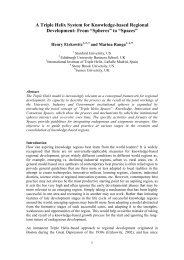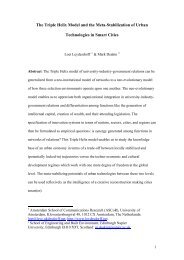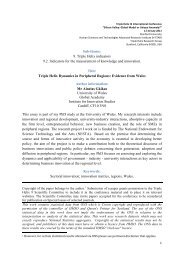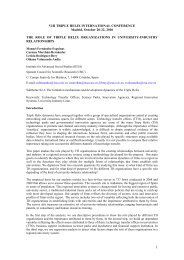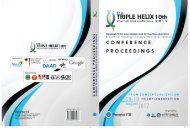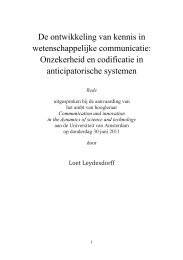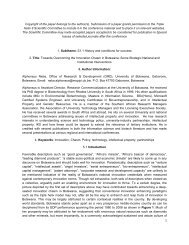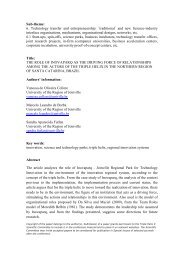TRIPLE HELIX noms.pmd
TRIPLE HELIX noms.pmd
TRIPLE HELIX noms.pmd
You also want an ePaper? Increase the reach of your titles
YUMPU automatically turns print PDFs into web optimized ePapers that Google loves.
P-018Strategic complementarity data bank of The Brazilian System of TechnicalAnswer to dialogue’s refinement of the Triple Helix.Elisabeth Motta, Rede de Tecnologia do Rio de Janeiro, BrazilEmmanuel Andrade, Universidade Federal Fluminense, BrazilIntroductionThe “call for papers” of the VIII Triple Helix Conference claims, based on the approach of “triple helix” (TH) developed by HenryEtzkowitz and Loet Leydesdorff, that the University should be leader in the relationship between the Industry and the Governmentto conceive new knowledge, innovation and economic development. If the University leadership in this process is in fact distincttrace and structural component of the TH model, is necessary the existence of a relationship standard where different “cultures”(university, industry, government) not only can recognize, communicate and respect them mutually but also where the specificitiesof the university to lead the process are recognized and legitimate.This present paper examines the elements present in building TH relationship starting from accreditation initiatives of a foodcollege lab and having as reference the operation of the institutional gadget called Brazilian Technical Answers Service (SBRT)and its goal is to make the access of the Brazilian micro and small enterprises (MPES) possible to the information to technologicalpotential solutions at the same time to give diffusion and potentialization of the accumulated knowledge in the institutions ofscience and technology of the country, establishing fast connection between demands and competences anywhere in Brazil.State of the art about the topicSocial demands related to environment has lead the industry in general and the food and liquor sector particularly incorporatedit in its practice the service of quality and productivity standards that, if by one side they look forward to turn them competitiveand sustainable, by other hand they end up by promoting and/or facilitating the dialogue among previously mentioned “cultures”.Studies (GONÇALVES, 2005; ANDRADE, 2007 LIGIÉRIO, 2003) show that the document delivery and findings, for instance,the descriptive memorial of production and economic-sanitary memorial to the regulative origins about products to be launchedin the market have been a technological barrier to the small and medium enterprises’ development.Experimental analysis college labs by their turn have an important part in the formation and in the students and researchers’development as knowledge creators as they give the chance to suggest, verify and prove theoretical assumptions. Starting fromalready known experimentation methodology the students are motivated to create new assumptions and/or models, contributingfor the creation of the tacit knowledge in the organization.Research focusThe research focus resides in to bring forth the strategic complementarity among the gadgets like SBRT, from para-governmentalnature and the academic gadget like college lab to build that we call inter-cultural dialogue that allows and consolidate the THco-operation.MethodologyThe research was restrict to food sector due to the representativeness of this segment between the MPES – Rio de JaneiroState and in the other hand by the fact this sector is directly related to a limiting factor of market: non-tariff or technical barriers.To identify the need of the MPES to technological information, it was used the SBRT data bank as research tool and theuniversity side it was analyzed the experimental nutrition lab – Fluminense Federal University – UFF.FindingsTo treat the relation between college labs and the MPES, this research basted relevant factors, verified tendencies, examinedmenaces and opportunities and put them in perspective a diversified cluster of actions apparently disconnected but that goes indirection of consolidation of a global standard of inter-agents communication. The use of the SBRT data bank to it looks forwardthe experience of accreditation of a nutrition lab (LABNE) according to the NBR ISSO/IEC17025 gave the conductor wire to thediagnosis and the conclusions that we present here.Solutions were proposed to the confrontation of questions resulting from differentiated stage of organization ripeness of theagents in relation of the college labs certification of the use of multi-user equipment and college administration.When we examine in a crossed way the insights of the LABNE, we noticed the conflict between the pluri-disciplinary charactersthat the demand covers itself in contraposition to organization in general to discipline the college labs linked to the academicdepartments in the great majority. This is a kind of problem because it demands better communication not only among labs andthe MPES world but also and mainly better ways in relations and inter-labs communications.Madrid, October 20, 21 & 22 - 2010232



